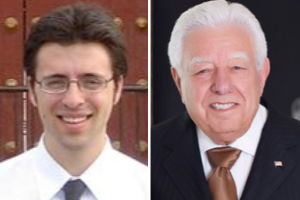Here’s a different view of diversity, courtesy of a couple of speakers who recently took separate stages in Orange County.
One is a thirtysomething son of a university professor. He got a college degree for himself, now makes a living as a political pundit, and still looks as though he’d be comfortable crashing on a buddy’s couch for the weekend.
The other is a dapper gent in his 90s, the son of a janitor. He joined the U.S. Navy at the age of 16, fought in World War II, and founded a business that has brought him a fortune estimated at hundreds of millions of dollars.
Those are only the most obvious differences between Ezra Klein, editor-at-large of political news and opinion website Vox, and Paul Musco, founder of Santa Ana-based precious metals supplier Gemini Industries.

Klein was firmly in his comfort zone when he gave a talk in a meeting room at the Student Center of the University of California-Irvine on the afternoon of Feb. 7.
Musco moved a ballroom full of business executives and political pros beyond their comfort zones with his remarks as a panelist – a turn that came just a couple of hours later and a few miles away in a ballroom at Hotel Irvine, where the Orange County Business Council held its annual dinner.
Klein was forthright with the fact that he leans to the left when it comes to his view of the world.
Musco voiced his concerns without citing any particular political point of reference.
Klein’s talk focused on identity politics – the notion that individual voters are part of one or more groups that define them in terms of American politics. White or minority; urban, suburban or rural; white-collar or blue-collar; Baby Boomer or Millennial – you get the idea.
It’s a political trend that has grown – and will continue to grow – with the digital revolution that has made marketers of everything from pizzas to political parties eager to translate your every movement and purchase into data. The data goes into a profile. The profile is the core of an identity that can serve as the basis for a sales pitch.
It’s enough to fill a book – Klein is working on one, and his talk at UCI left the impression that it will be well worth reading.
Musco, meanwhile, was part of a panel titled “The Art of Business. The Business of Art.” He’s given tens of millions dollars to the arts and other philanthropic causes – perhaps hundreds of millions. A world-class performing arts center at Chapman University bears his name, along with the name of his wife, Marybelle.
Different individuals, different venues, different subject matter.
Different approaches, too.
Musco veered off his given topic of art to challenge the Orange County Business Council crowd directly with a socioeconomic critique. Too many folks who go to work every day in Orange County can’t afford to live there, he said. Musco cast the condition as a basic problem that raises all sorts of barriers for members of the working class who are looking to improve their circumstances. He called on his fellow business executives to do better on matching wages with the cost of housing.
Some business executives wrap similar statements in terms of enlightened self interest, selling the notion as a necessary move to ensure the workforce that the local industry needs. Musco’s message sounded more like a simple call to pony up because it’s the right thing to do.
Klein’s point of view also tends to favor higher wages for working folks, although his vocabulary differs from Musco’s. Klein talked about people “designing their lives to activate the identities they want.” That seemed to resonate with the university crowd – although it made me wonder how many of those folks commuting from the Inland Empire to OC every day have the luxury of “designing” their lives by the time they’ve punched the clock and paid the bills.
Some of the differences between Musco and Klein – and how they came to be speaking to very different crowds in very different places on the same night in the same city – explain their distinct vocabularies.
They both, however, seem to be after the same thing – a society and economy that do a better job of matching rewards to efforts, opportunities to ambitions, resources to needs.
And Klein is capable of getting his point across in simpler language.
He told the crowd at UCI that today’s politics too often “start with politics and work back to identity.” It would be better, he offered, if we worked “from identity up to politics.”
Something tells me Musco has done exactly that over the course of his 93 years.
Perhaps Klein should look him up before he puts that book to press.
Churm to Narike Preciado to Future Generations

The main event at the Orange County Business Council was the handoff of the chairperson’s duties from Steve Churm, chief communications officer of FivePoint Holdings LLC in Irvine, to Robbin Narike Preciado, managing director and regional president for the Consumer and Business Bank at MUFG Union Bank.

Churm’s eloquent signoff and Narike Preciado’s enthusiastic acceptance from the podium suggested the outfit is well positioned to address some of the key challenges for Orange County as it faces the future.
This video of members of one of the various youth ensembles fostered by the Pacific Symphony Orchestra gave ample evidence that there is plenty to be hopeful about when it comes to OC’s next generation.
Will LA Daily News Call USA Today a Cousin?
Here’s what to watch for as the most overlooked story in Southern California plays out: the share price of Tysons Corner, Virginia-based Gannett Co., which made a play to acquire the LA Times just two years ago but now finds itself in the cross-hairs of the MNG Enterprises Inc. in Denver.

MNG was known as Digital First Media until recently and remains notorious for newsroom cuts. It is backed by New York-based hedge fund Alden Global Capital and counts the LA Daily News, Orange County Register, Long Beach Press-Telegram, the Daily Breeze in Torrance, Pasadena Star-News, San Gabriel Tribune, Whittier Daily News, Inland Valley Daily Bulletin, San Bernardino Sun, Riverside Press-Enterprise and Redland Daily Facts as part of a portfolio of about 200 publications nationwide.
The Southern California group of publications claims a combined readership of about 3 million daily, according to privately held MNG.
Publicly traded Gannett owns more than 100 newspapers, including its flagship USA Today. The company’s shares closed yesterday a tad under $11 a share, for a market capitalization of about $1.2 billion.
Lots to track on this one, including a report in the February 11 edition of USA Today that MNG had offered $1.8 billion to buy Gannett in a deal to be financed by debt.
Reliable sources indicate that might be so much posturing. They peg a deal as likely in the range of $1.5 billion and $1.6 billion – which would come to somewhere between $13 and $14 for Gannett shares.
APL’s Cowboy Connection
The whole menu at Adam Perry Lang’s APL Restaurant at the Taft Building at Hollywood and Vine is worth exploring, but you’ve got to have some beef. And don’t forget that urbane chefs such as Lang and the urban foodies he serves count on cowboys such as John Tarpoff, vice president of beef at Northglenn, Colorado-based Niman Ranch, when they want that particular brand of protein on their plates.

Lang and Tarpoff got together a few weeks back to put on a dinner at APL for some of SoCal’s top chefs and restaurateurs hosted by Niman Ranch and Brea-based West Coast Prime Meats, with wine pairings by Trinchero Family Estates in Napa Valley. Their mutual respect was surpassed only by the good times their guests had sampling everything from sliced and chilled beef that had dry aged for 180+ days to prosciutto with pear and mint and fried shishito peppers with fermented chiles and pecans, among other offerings.
Bill, Mohamed Make FT Sandwich
It seems that Bill Gross and Mohamed El-Erian – perhaps Southern California’s most globally renown financial thinkers – just can’t shake each other.
The pair served as co-chief investment officers at Pimco when the Newport Beach-based investment house hit its apex of nearly $2 trillion in assets under management.
They shared the glare of speculation about El-Erian’s 2014 departure – which he described as a step to spending more time with his daughter, and had him continuing in a part-time advisory role for Pimco’s Munich, Germany-based parent Allianz SE.
They were linked months later in press reports about workplace tensions during their time together. Gross left Pimco – which he cofounded in 1971 – months later, shifting to Janus Henderson in a move that shook the world of high finance.
Both already are sure-fire Hall of Famers in the financial world – even if El-Erian has been more of a commentator than money manager lately, and Gross fell short of burnishing his reputation as the “Bond King” in a bumpy run at Janus.
Both still get the attention of the markets in any case, as indicated in the February 5 edition of the London-based Financial Times, which opened with a story on Gross’ departure from Janus and closed with a column by El-Erian that carried an unintended irony in an editor’s headline about a “path back to golden days” for markets.

Huizar Updates: No Word on Pot Shop, PSF for Paloma Street …
Still no response from 14th District Los Angeles City Councilmember Jose Huizar to questions on his proposed deal to lease 36,000 square feet at a warehouse at 1426 Paloma Street on the southeastern edge of Downtown for conversion to a homeless shelter that would offer addiction services – and whether a marijuana shop would remain in place across the street.

Another pending question for Huizar is on the lease rate of $37,000 a month, which comes to around $1.02 per square foot. That’s nearly 30% above the average asking lease rate for industrial space in the Central Los Angeles area, which clocked in at 79 cents per square feet in the fourth quarter, according to Jones Lang Lasalle Inc.
It’s fair to note that industrial space – a category that includes both warehouse and manufacturing facilities – is generally hot these days.
But it’s not uniformly hot everywhere – and the building on Paloma isn’t cutting-edge by any means.
A September 2018 report from the city’s Department of General Services said that the “price per square foot (psf) for a similar location and type of warehouse space ranges from $0.85 to $2.00,” offering that as justification for paying a rate of 98 cents per square foot at the time; the more recent data indicates the city has gone up a few cents since then.
The report didn’t define what was considered “similar” in terms of location and type of warehouses space. Careful there, because there can be vast differences between 14th Place and Paloma and other, more modern warehouses nearby on Alameda or in Vernon or City of Commerce.
… ‘Unusual Cirucumstances’ on Night on Broadway
Huizar did provide a response of sorts recently to SullivanSaysSoCal’s request for financial records related to last year’s Night on Broadway.
Huizar’s office produced the event, drawing a reported 250,000 to Downtown last year for the one-day event, peddling sponsorships, and charging fees for vendors.
There’s apparently some difficulty in getting the books together, according to this message from Huizar’s office.
This email is in response to your request received by the Office of Los Angeles Council District 14 seeking records pertaining to Night On Broadway pursuant to the California Public Records Act (CPRA).
Please be advised that as allowed by state law this office we will need 14 additional days to respond to your request given that “unusual circumstances” exist, defined in California Government Code section 6253(c), because of the need to search for, collect, and appropriately examine a voluminous amount of separate and distinct records.
We shall make a determination concerning your request on or before February 15, 2019.
Thank you.
The original request for information was made on January 23, and this extension for “unusual circumstances” per state law allows Huizar’s office until this Friday to decide whether to make the financial records on a public event produced by public officials available to the public.
Stay tuned.
Sullivan Says
 Here’s why the rigmarole over conditions along the Santa Ana River was worth the effort to remove homeless encampments from its banks over the past year or so – offered with a tip of the cap to U.S. District Judge David Carter.
Here’s why the rigmarole over conditions along the Santa Ana River was worth the effort to remove homeless encampments from its banks over the past year or so – offered with a tip of the cap to U.S. District Judge David Carter.


